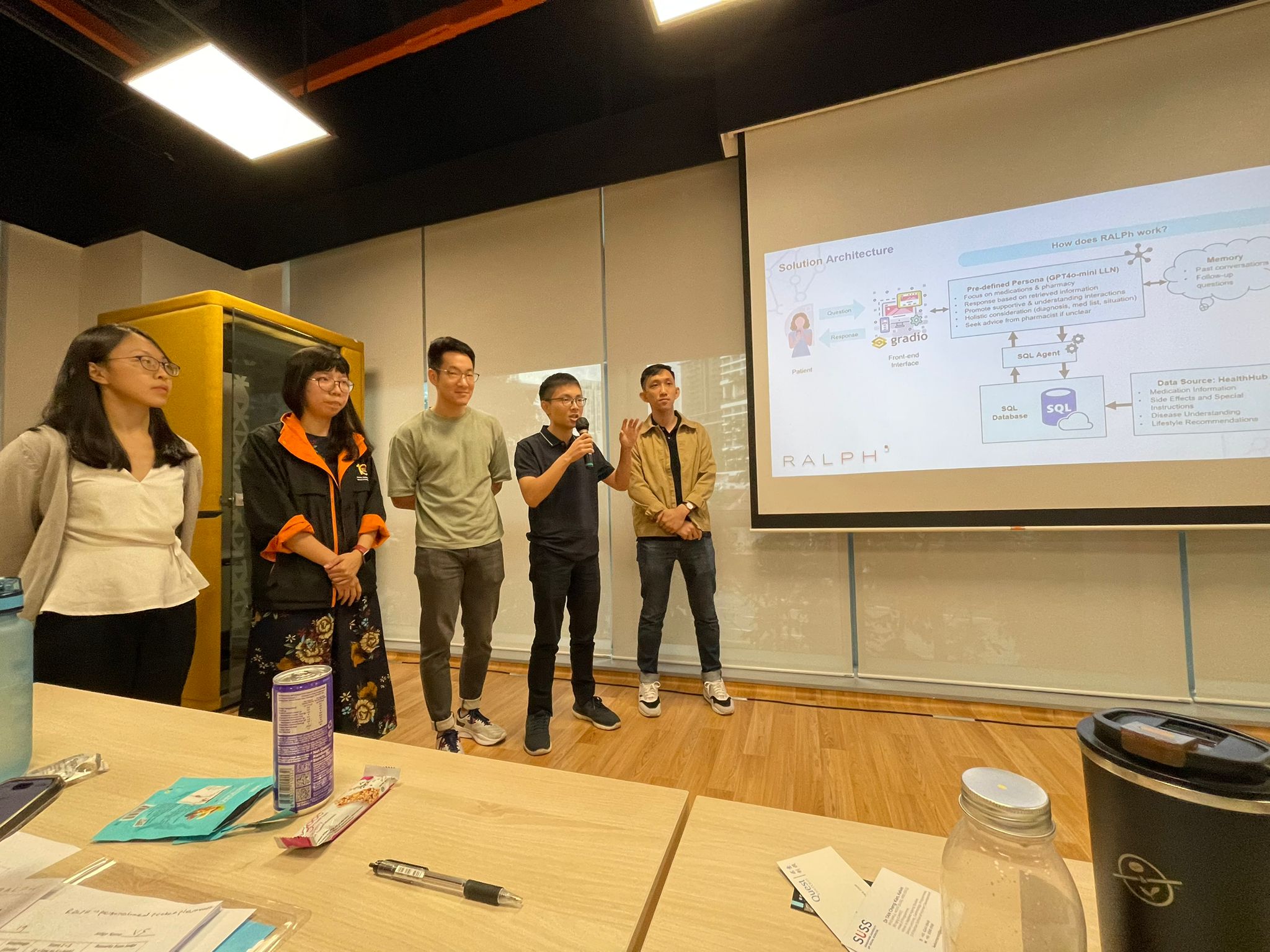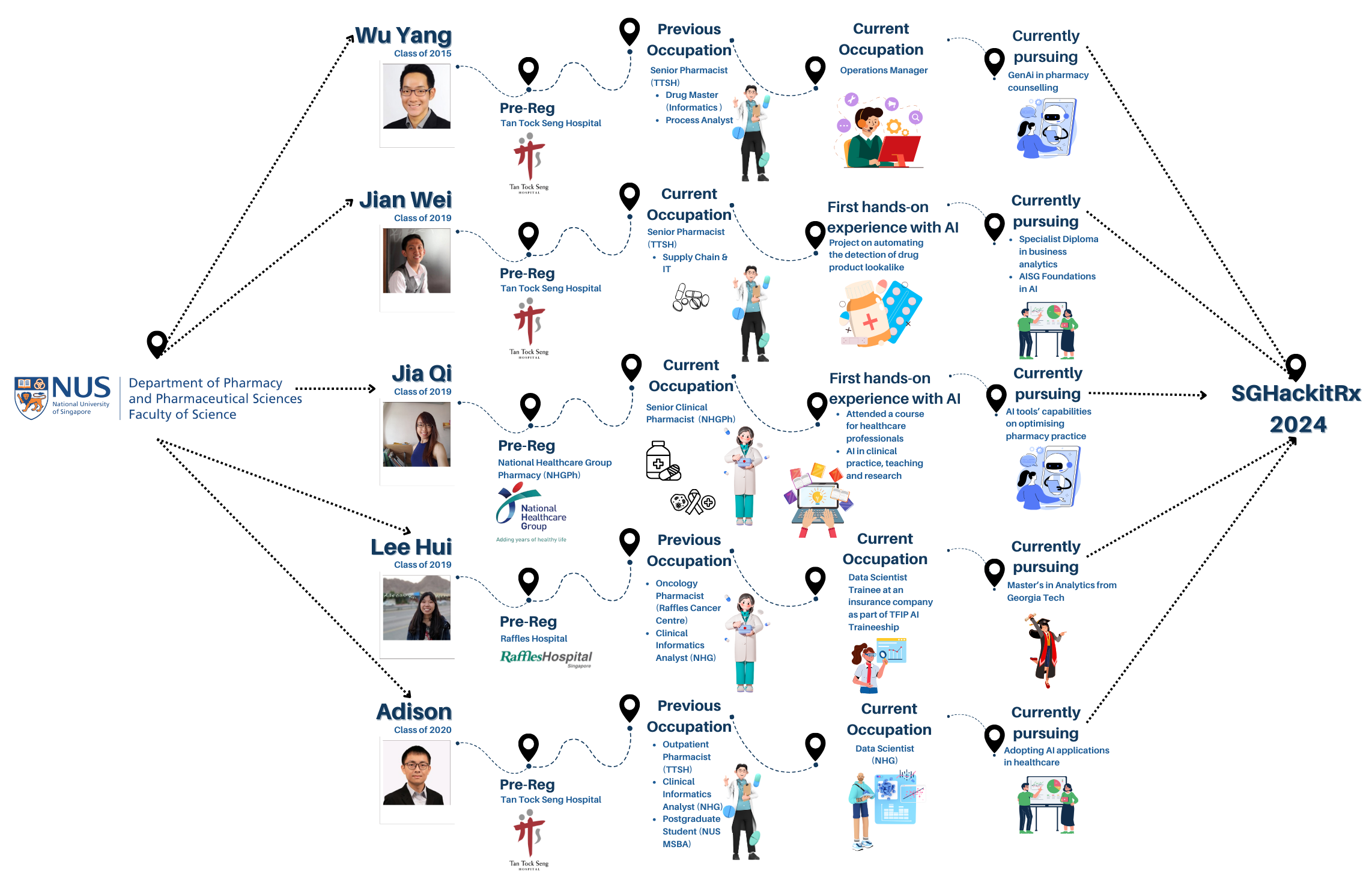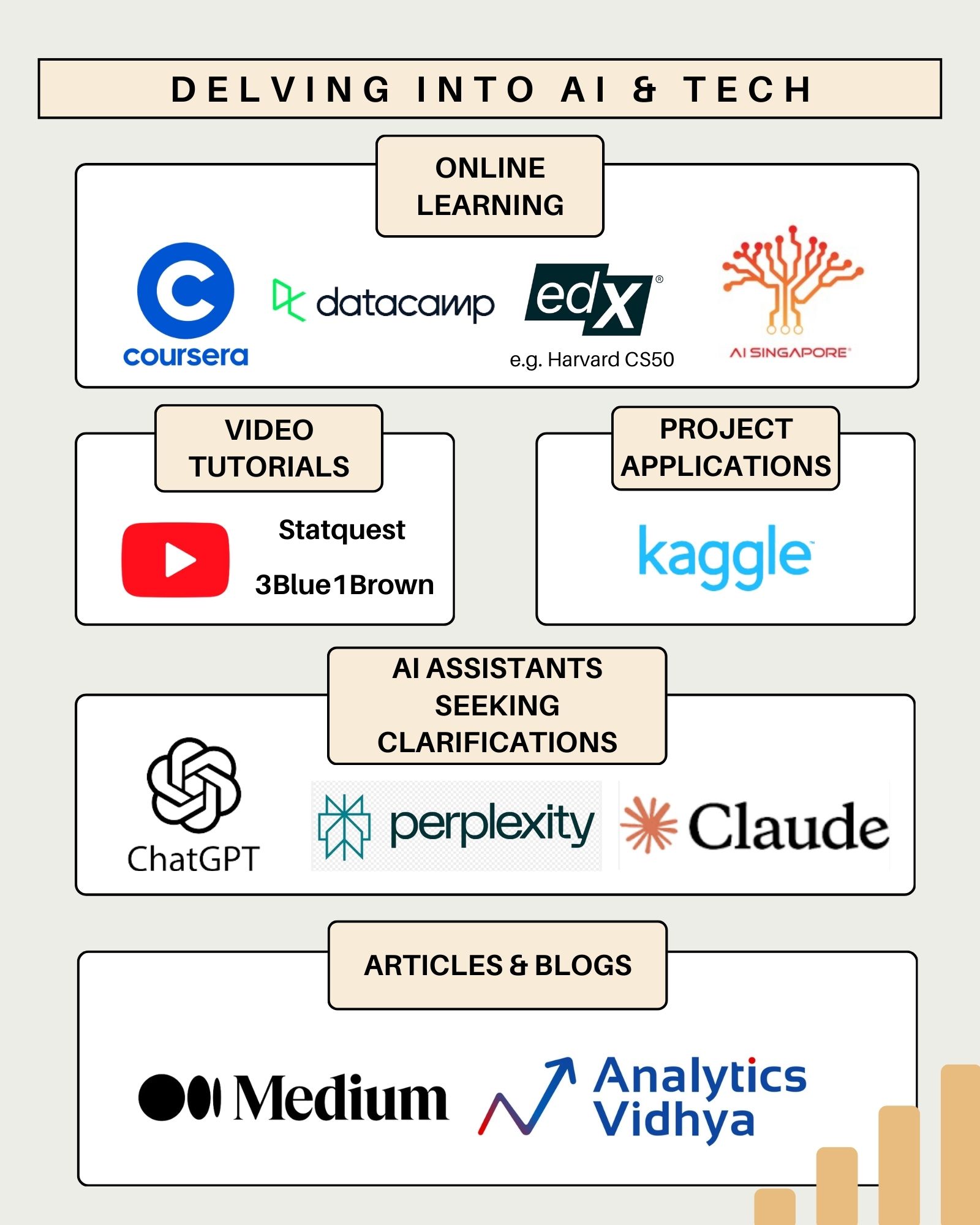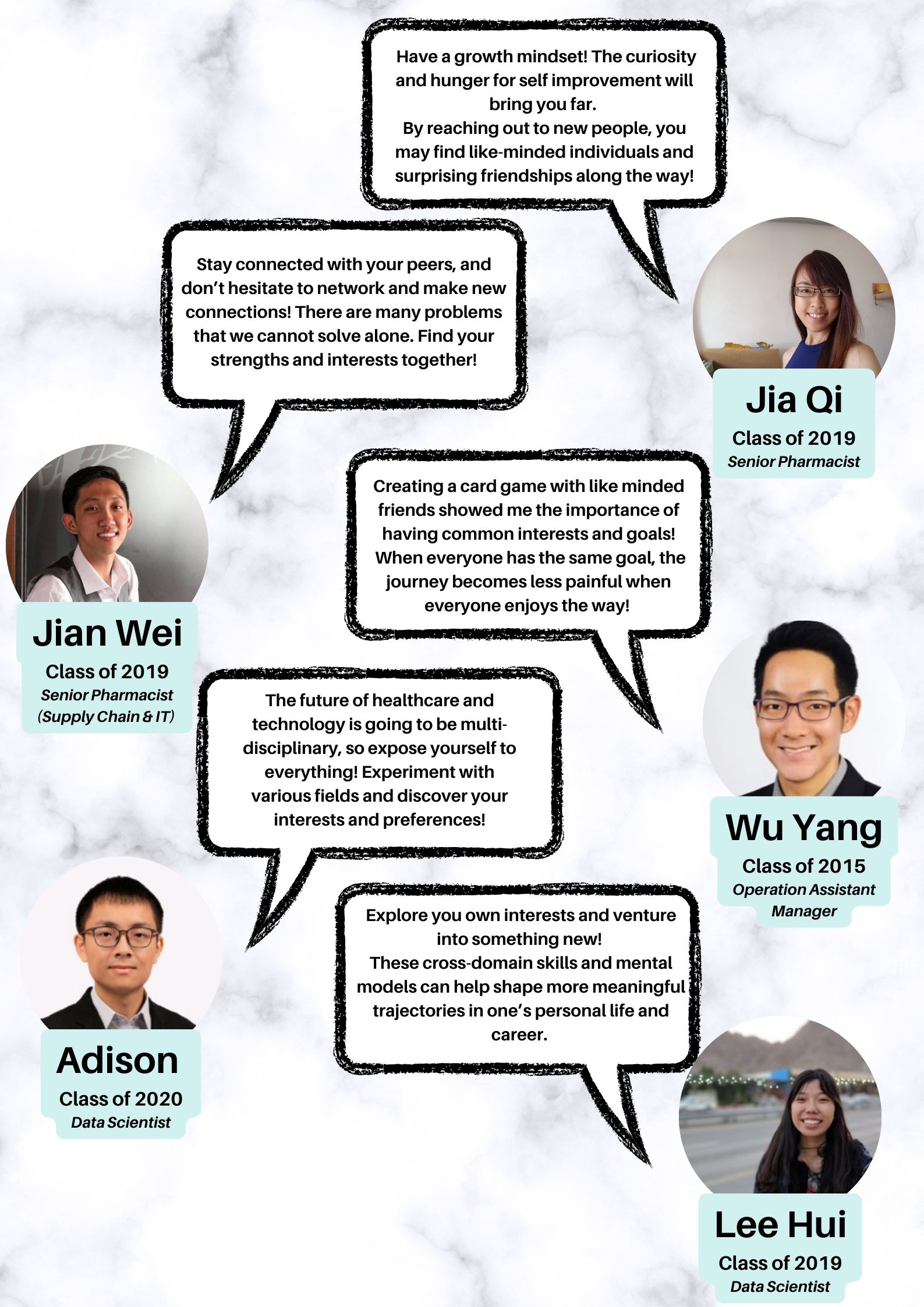Harnessing AI in Pharmacy: Catalyst or Challenge?

The rapidly changing healthcare landscape calls for healthcare professionals to not only be constantly updated to new medications and protocols, but to also embrace changes to their traditional workflow and accept new innovations. To kickstart the journey of innovation, an inspiring team of alumni pharmacists from diverse backgrounds, united by a shared passion for artificial intelligence (AI) and technology, banded together to participate in the 33rd Singapore Pharmacy Congress (SPC) 2024 Hackathon, SGHackitRx 2024 organised by Pharmaceutical Society of Singapore (PSS).
Wu Yang (Class of ’15), a pharmacist who transited to hospital operations, and Jian Wei (Class of ’19), a supply chain and IT pharmacist, are joined by Jia Qi (Class of ’19), a clinical pharmacist, alongside Lee Hui (Class of ’19) and Adison (Class of ’20), who have both transitioned from pharmacists to work as data scientists. They have had a history of working together from previous collaborations and in academic settings. Upon learning about the hackathon, they reconnected to launch their project, RALPh (Retrieval Augmented Large Language Model Pharmacist), an innovative initiative that aims to harness generative AI (GenAI) to automate medication counselling and revolutionise the role of pharmacists in patient care.

The team presented at the hackathon at A.L.I.C.E @ SGH Campus.
From left to right: Jia Qi, Lee Hui, Wu Yang, Adison and Jian Wei.
AI – Treat or Threat for Pharmacists?
On the surface level, RALPh could potentially automate pharmacy medication counselling and ironically perpetuate a common concern that AI is a threat to pharmacists. However, the team feels passionately that this project and AI are tools not to displace, but to empower pharmacists. They envision that the use of RALPh would create breathing space for pharmacists to invest more time in patients with multimorbidities that require complex care and partake in higher value work and projects.
They see an unique opportunity now to integrate existing digitization efforts and are embarking on making their plans come to fruition. They envision automating lower-risk medication counselling services using GenAI and connecting patients conveniently to pharmacy services through the use of mobile phones.
Same, same, but different
While everyone graduated from NUS Pharmacy, each team member charted their unique and distinct path to arrive at their current role and interests in AI and technology.
Wu Yang has had a long interest in IT and was inspired to see how GenAI can be deployed to create meaningful products to improve work processes and the way of life. He is excited about using GenAI to transform pharmacy counselling and improve patient care, ultimately revolutionising the healthcare setting.
Jian Wei, who was initially interested in clinical practice, took a leap of faith to explore a role in drug record maintenance and the pharmacy supply chain. Being surrounded by colleagues passionate about technology and AI allowed him to grow and seize opportunities in this field. He recently completed a specialist diploma in business and big data analytics, and is now exploring the use of machine learning in the detection of look-alike drugs
For Jia Qi, she was inspired by AI’s potential in healthcare through a specialised course for healthcare professionals on the use of AI in clinical practice and research. She also excitedly shares her beliefs in the role of AI in complementing patient care and optimising practices.
Lee Hui and Adison started in clinical pharmacy but have courageously taken a different turn in their career paths to pursue their interests in AI and technology. Lee Hui’s journey was driven by a desire to enhance processes through AI upon her clinical experiences. As an oncology pharmacist previously, she worked on inventory management projects involving high-cost oncology and haematology medications which sparked her interest to improve such processes. This led her to explore tools like Excel, macros, VBA scripting and eventually programming. Currently, she is on an AI traineeship under Technology in Finance Immersion Programme (TFIP) while pursuing a Master’s in Analytics from Georgia Tech. Adison’s initial curiosity about computing stemmed from his undergraduate days through computing modules. Applying what he had learnt then, he developed an informational application on probiotics for his final year project under the guidance of A/P Chew Eng Hui and Dr Kevin Yap. This experience sparked his interest in leveraging technology to create a broader impact beyond direct patient care. Motivated by this interest, he took on a role as a Clinical Informatics Analyst at NHG after a stint as a pharmacist at TTSH, and subsequently pursued a Master’s in Business Analytics at NUS. He now works at NHG as a Data Scientist.
The infographic below summarises the unique paths of each alumni and how they are now brought together by a common interest in AI and technology.

Post-Hackathon: The next steps and aspirations

The team hopes to work towards seeing their product deployed in the market and experience firsthand the effects of AI-driven counselling. Making it into the top 3 of the hackathon, the dreams of the team seem closer than ever before. They envision pharmacies being augmented by AI-driven counselling, while patients are able to seamlessly access medication related counselling on their electronic devices from the comfort of their own homes. Such a setup would allow for detailed, personalised consultations to be reserved for more complex cases, streamlining operations and enhancing patient care.
The team hopes for current pharmacy students to be better equipped to use AI competently and shared some tips and tricks in the infographic below. According to the team, one need not be proficient in coding to harness AI and technology. Instead, a foundational understanding of the underlying technologies, combined with a deep knowledge of the problem being addressed (through your pharmacy practice or domain knowledge), is immensely helpful in order to grasp the potential of AI, effectively implement and advocate for new innovations. Aside from the various tools and platforms for learning, they recommend engaging with people who share similar interests in the community to enhance one’s knowledge and confidence in the field.
The infographic below presents a selection of useful AI tools recommended by the team, catering to both beginners taking their first steps in AI and those eager to delve into more advanced technical applications.

Lessons from the Past: Parting Inspirations
When reflecting on their school days, the team members recalled fondly shared experiences and collaborative projects that shaped their careers. Together, they emphasise on the importance of fostering connections, embracing new experiences, and maintaining a growth mindset for personal and professional development. Their advice, summarised in the figure below, underscores the value of collaboration, curiosity, and adaptability in shaping future careers.

As pharmacists continue to evolve alongside technology, the team’s journey serves as a reminder that innovation and collaboration are key to shaping the future of pharmacy. With AI as a powerful ally, the possibilities for improving patient care and pharmacy practice are endless.
We extend our heartfelt gratitude to Jian Wei, Wu Yang, Adison, Lee Hui and Jia Qi for generously sharing their stories and experiences, and going beyond to share important advice with us! Their passion, dedication and courage have been very inspiring. We wish everyone in the team an enriching journey ahead with more successes to come!
Article by NUSPS Pharmacy Profession Awareness Committee (PPAC) – Chong Zi Hao Joe (Year 2 Pharmacy), Lim Li Ting (Year 1 Pharmacy), Eugenia Koh Yu Qing (Year 1 Pharmacy)
Share this article:
Stay connected with NUS Pharmacy!
Receive PharmConnect Newsletters & announcements by NUS Pharmacy.
